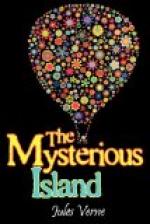It was to say the least very extraordinary, and they were compelled to believe that Tabor Island was not or was no longer inhabited. Perhaps, after all the document was already several months or several years old, and it was possible in this case, either that the castaway had been enabled to return to his country, or that he had died of misery.
Pencroft, Spilett, and Herbert, forming more or less probable conjectures, dined rapidly on board the “Bonadventure” so as to be able to continue their excursion until nightfall. This was done at five o’clock in the evening, at which hour they entered the wood.
Numerous animals fled at their approach, being principally, one might say, only goats and pigs, which were obviously European species.
Doubtless some whaler had landed them on the island, where they had rapidly increased. Herbert resolved to catch one or two living, and take them back to Lincoln Island.
It was no longer doubtful that men at some period or other had visited this islet, and this became still more evident when paths appeared trodden through the forest, felled trees, and everywhere traces of the hand of man; but the trees were becoming rotten, and had been felled many years ago; the marks of the axe were velveted with moss, and the grass grew long and thick on the paths, so that it was difficult to find them.
“But,” observed Gideon Spilett, “this not only proves that men have landed on the island, but also that they lived on it for some time. Now, who were these men? How many of them remain?”
“The document,” said Herbert, “only spoke of one castaway.”
“Well, if he is still on the island,” replied Pencroft, “it is impossible but that we shall find him.”
The exploration was continued. The sailor and his companions naturally followed the route which cut diagonally across the island, and they were thus obliged to follow the stream which flowed towards the sea.
If the animals of European origin, if works due to a human hand, showed incontestably that men had already visited the island, several specimens of the vegetable kingdom did not prove it less. In some places, in the midst of clearings, it was evident that the soil had been planted with culinary plants, at probably the same distant period.
What, then, was Herbert’s joy, when he recognized potatoes, chicory, sorrel, carrots, cabbages, and turnips, of which it was sufficient to collect the seed to enrich the soil of Lincoln Island.
“Capital, jolly!” exclaimed Pencroft. “That will suit Neb as well as us. Even if we do not find the castaway, at least our voyage will not have been useless, and God will have rewarded us.”
“Doubtless,” replied Gideon Spilett, “but to see the state in which we find these plantations, it is to be feared that the island has not been inhabited for some time.”
“Indeed,” answered Herbert, “an inhabitant, whoever he was, could not have neglected such an important culture!”




